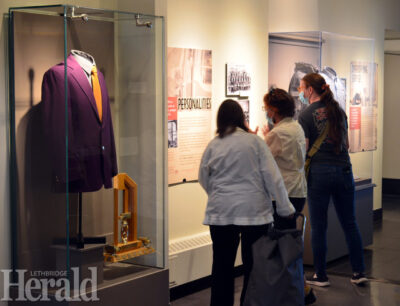Public transit policies need an overhaul, says researcher
By Ry Clarke - Lethbridge Herald Local Journalism Initiative Reporter on July 22, 2022.
 Herald photo by Ry Clarke
Visitors take in the Galt exhibit on the History and Evolution of Transportation, as the museum hosted an event Wednesday afternoon, Re-Thinking Public Transportation, with presenter Stephnie Watson.
Herald photo by Ry Clarke
Visitors take in the Galt exhibit on the History and Evolution of Transportation, as the museum hosted an event Wednesday afternoon, Re-Thinking Public Transportation, with presenter Stephnie Watson.The Galt Museum hosted Re-Thinking Public Transportation on Wednesday afternoon, a look at the history and challenges in the transportation field.
The event was presented by Stephnie Watson, an environmental professional from Saskatoon, Sask. Watson held an open forum lecture giving audience members an insight into how we view our transportation system here in Lethbridge, with opportunities to freely discuss the topic and engage with the data.
Watson had previously run for city council here in Lethbridge back in 2017 where her thesis focusing on transit in Lethbridge was one of the main reasons for spurring her political decision. Watson sees issues in transportation as something that needs to be assessed and revamped to accommodate for changing times, especially with concerns of rising prices across all fields.
“We can’t rely on the systems that our grandparents and parents utilized, which was more public for smaller areas. So we have to pay for vehicles, and it can’t just necessarily be one vehicle, it has to be multiple vehicles. I don’t know how people with families can afford it, you’re sacrificing time, earning power, and job opportunities if you don’t have a private vehicle, and instead are relying on public transit.”
Watson’s presentation focused on the urban areas of transportation along with economic issues, like how we go to work, families with daycare, and the age ranges on riders.
“The majority of the riders that use transit in Canada are transit dependent people. That means they’re low mobility, generally seniors or post secondary low-income or school age youth, and they don’t really have alternative transportation options.”
Using data from their thesis published back in 2018, Analysis of Operational Data from the Lethbridge Transit System with Respect to the Environment, Population, and Spatial Context, Watson compares the age range, gender, and location of the average transit user and showcases to the audience how we should be viewing issues where volume is higher and offering solutions that could be implemented and improve the system.
Watson says a well-maintained system will improve other issues like parking, tourism, and safety.
“Transit gets us to those areas like recreation and it would increase people’s ability to access different recreation areas too, and help drive the economy. Because that’s the other thing, if you’re only paying $20 a month for transit, you don’t have to drive your car as much, you might not even need to have a car at that point.”
Watson completed her Bachelor of Science and Masters of Science in Environmental Science here at the University of Lethbridge with a specialization in research and is currently working to build up her business, Sherlock and Watson Scientific, where they focus on environmental awareness giving scientific outlooks to how we live.
The proactive approach to change helps break the cyclical issues that repeat themselves and coming at problems with an academic tactic helps push the change.
“There’s been so many advancements in technology in regards to data analysis,” said Watson. “It would be amazing to be able to do more in-depth analysis, and it would be amazing to get the funding to actually go out on foot and canvass the neighbourhoods to get more direct information from people.”
The Galt offers many informational sessions like Watson’s Re-Thinking Public Transportation, hoping to share knowledge and history with the public while offering opportunities to engage and reflect.
Currently it has an exhibit on the history of transit in Lethbridge with many historical pieces showcasing the evolution of transportation in the City. More information is available on the website at galtmuseum.com.
15-14


